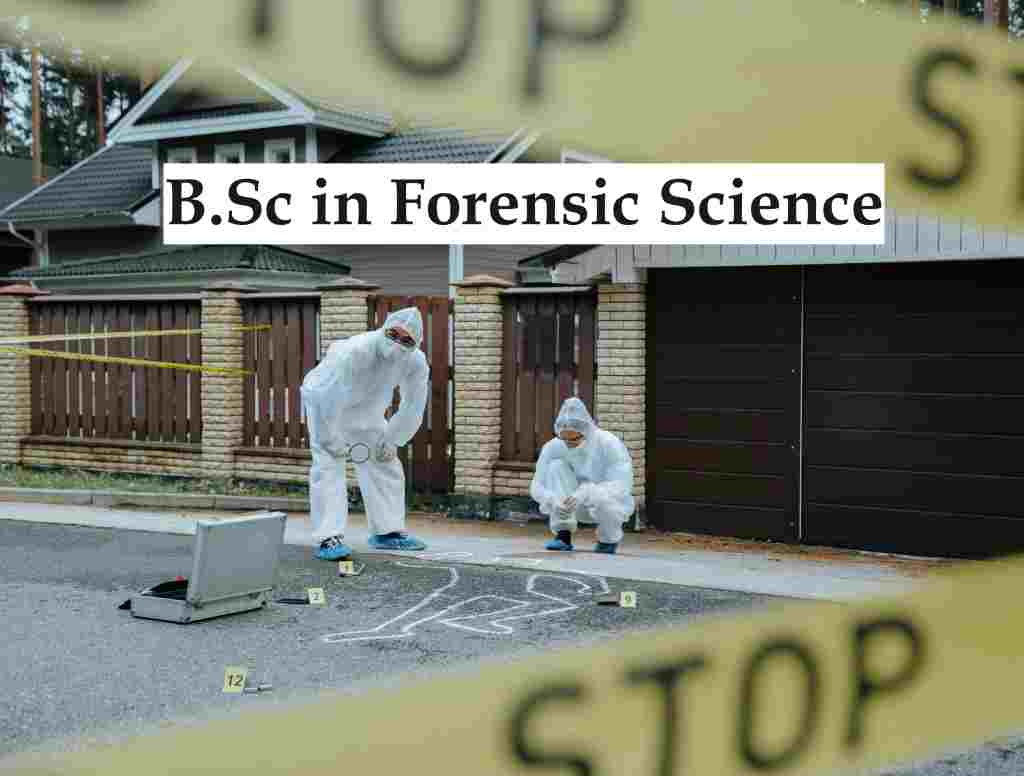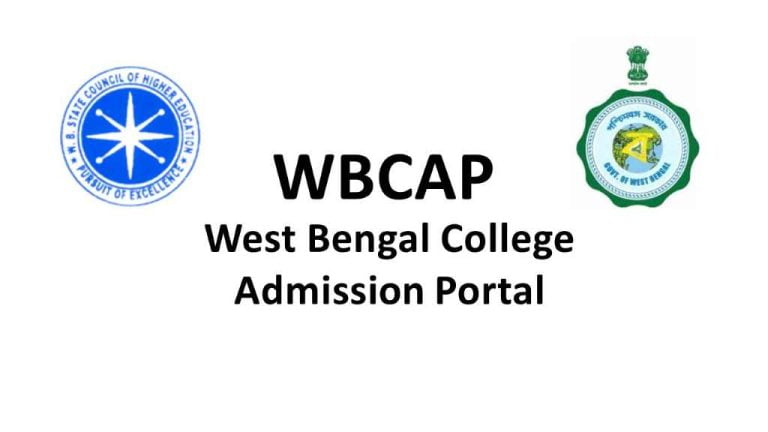BSc in Forensic Science: Admission Procedure, Eligibility, Course Curriculum for 2024
At present, students’ inclination towards general education is less, compared to that, new work-oriented education has spread. This blog will discuss these courses as per the future demand, the importance of which is increasing daily and will increase further in the future. The name of the course is Forensic Science. In this blog, BSc Forensic Science and related essentials are discussed. Those who want to do this course will get all the information they need from this blog. Hope this blog will help those students to select this course

| Course Name | B.Sc in Forensic Science |
| Course Duration | 3 to 5 Years |
| Course Eligibility | 10+2 or Equivalent Examination Passed |
| Available Entrance Exam | Yes |
| Course Entrance Exam Name | AIFSET, CUET, GATE, JEE Main, WBJEE |
| Admission Start | May to August |
| Available College | Government & Private College |
| Scholarship Available | Yes |
| Education Loan Available | Yes |
| Course Cost | ₹75,000 to ₹2,30,000 per year |
| Competition in Career | Less Competition |
| Forensic experts needed in the future | Increasing |
| Starting Salary | ₹350,000 to ₹900,000 per year |
| Job opportunities in Foreign Countries | Yes |
BSc in Forensic Science: Admission Procedure, Eligibility, Course Curriculum for 2024
- What is Forensic Science?
- How Important is Forensic Science in Education at this time?
- Why should you choose Forensic Science in education?
- What is the minimum qualification for a B.Sc in Forensic Science?
- Entrance Exam available for B.Sc in Forensic Science in India
- B.Sc Forensic Science Course Duration
- Name of College and University of B.Sc in Forensic Science
- Total Cost of B.Sc in Forensic Science
- What option is available after completion of a B.Sc in Forensic Science?
- What is the starting salary after completing a BSc in Forensic Science?
What is Forensic Science?
Forensic science is the application of scientific principles and techniques to investigate crimes and legal issues. It involves the collection, preservation, analysis, and interpretation of evidence found at crime scenes. Forensic scientists use a variety of disciplines such as biology, chemistry, physics, and mathematics to uncover crucial information that can be used in court proceedings. This can include identifying suspects, linking evidence to individuals or objects, determining the cause of death, and providing expert testimony. The goal of forensic science is to provide objective, scientific analysis to assist law enforcement agencies and the legal system in solving crimes and achieving justice.
How Important is Forensic Science in Education at this time?
Forensic science education is increasingly important in the current era due to several factors:
Advancements in Technology: Technology is constantly evolving, leading to more sophisticated forensic techniques and tools. Education in forensic science ensures that professionals are equipped with the latest knowledge and skills to utilize these technologies effectively.
Growing Demand: There is a growing demand for forensic science expertise in various fields including law enforcement, criminal justice, legal practice, and academia. Education in forensic science helps meet this demand by producing qualified professionals who can contribute to solving crimes and ensuring justice.
Interdisciplinary Nature: Forensic science is inherently interdisciplinary, drawing from various scientific disciplines such as biology, chemistry, physics, and computer science. Education in forensic science provides students with a well-rounded understanding of these disciplines and their applications in criminal investigations.
Crime Prevention and Justice: Forensic science plays a crucial role in crime prevention and the administration of justice. By providing accurate and reliable evidence, forensic science helps law enforcement agencies identify suspects, link evidence to crimes, and secure convictions. Education in forensic science ensures that professionals have the necessary expertise to carry out these tasks effectively.
Public Interest and Awareness: There is a growing public interest in forensic science, fueled by popular media such as television shows and documentaries. Education in forensic science helps demystify the field and increase public awareness of its importance in solving crimes and ensuring justice.
Overall, forensic science education is essential in preparing the next generation of professionals to meet the challenges and demands of the modern criminal justice system. It provides students with the knowledge, skills, and ethical principles necessary to make meaningful contributions to society through their work in forensic science.
Why should you choose Forensic Science in education?
Choosing forensic science as your field of education can be influenced by various factors, including:
Interest in Crime-solving: If you have a passion for solving puzzles and mysteries, forensic science offers a unique opportunity to apply scientific principles to real-life crime investigations. The prospect of unraveling complex cases and bringing perpetrators to justice can be highly motivating.
Interest in Science: Forensic science encompasses various scientific disciplines such as biology, chemistry, and physics. If you have a keen interest in these subjects and enjoy conducting experiments and analyzing data, forensic science provides a practical application of your scientific skills.
Desire to Make a Difference: Forensic science plays a critical role in the criminal justice system by providing evidence that can help convict criminals or exonerate the innocent. If you have a strong sense of justice and a desire to make a positive impact on society, a career in forensic science allows you to contribute to the pursuit of truth and justice.
Diverse Career Opportunities: A degree in forensic science can lead to diverse career opportunities in various fields, including law enforcement, crime laboratories, forensic anthropology, forensic pathology, and forensic psychology. If you are interested in exploring different aspects of crime investigation and criminal justice, forensic science offers a wide range of career paths to choose from.
Fascination with Forensic Techniques: The use of cutting-edge forensic techniques such as DNA analysis, fingerprinting, ballistics, and digital forensics can be fascinating. If you are intrigued by the application of technology and scientific methods to solve crimes, forensic science may be the right fit for you.
Ultimately, choosing forensic science in your education is a personal decision that aligns with your interests, skills, and career goals. If you are passionate about crime-solving, science, and making a difference in society, forensic science can offer a rewarding and fulfilling career path.
Things you need to know before enrolling in the B.Sc Forensic Science course are,
- Minimum qualification for B.Sc Forensic Science
- B.Sc Forensic Science Entrance Test
- Duration of B.Sc Forensic Science Course
- Name of College and University of B.Sc Forensic Science
- Total Cost of B.Sc Forensic Science
- What option is available after completion of B.Sc Forensic Science?
- Career opportunities after completing B.Sc Forensic Science
The above points are discussed in detail below. Hope students’ ideas about BSc Forensic Science will be clear from these topics
What is the minimum qualification for a B.Sc in Forensic Science?
In India, the minimum qualifications for a Bachelor of Science (B.Sc) in Forensic Science can vary slightly depending on the university or educational institution offering the program. However, the typical requirements for admission to a B.Sc in Forensic Science program in India often include:
- Completion of Higher Secondary Education (10+2): Applicants are generally required to have completed their higher secondary education or its equivalent, which typically consists of 10+2 years of schooling with 50% marks. Many universities have a minimum percentage or grade requirement for admission to their B.Sc in Forensic Science program. This minimum requirement can vary depending on the institution
- Science Stream: Most universities require applicants to have completed their higher secondary education with a science stream, which includes subjects such as Physics, Chemistry, and Biology/Mathematics.
- Entrance Examination: Some universities or colleges may conduct entrance examinations for admission to their B.Sc in Forensic Science program. The format and content of these entrance exams can vary, but they generally assess the applicant’s knowledge of science subjects. In addition to university-specific entrance exams, some B.Sc in Forensic Science programs in India may accept scores from state-level or national-level entrance exams such as NEET (National Eligibility cum Entrance Test) or JEE (Joint Entrance Examination).
- English Language Proficiency: Proficiency in the English language may be required for admission to some B.Sc in Forensic Science programs in India, particularly for programs conducted in English.
It’s important to note that specific admission requirements may vary from one institution to another, so it’s advisable to check the admission criteria of the universities or colleges you are interested in applying to. Additionally, some universities may offer a B.Sc in Forensic Science as a specialized program within a larger science faculty, while others may offer it as a standalone program.
Entrance Exam available for B.Sc in Forensic Science in India
Some private colleges and universities offer direct admission to BSc Forensic Science based on the percentage of higher secondary (10+2 level) exams, but if you want to get admission in any government or top private colleges and universities then you have to appear for an entrance exam.
Here is a comprehensive list of entrance exams for B.Sc. Forensic Science programs in India, covering national-level, university-specific, and state-level exams:
National Level Entrance Exams
- National Forensic Science University (NFSU)
- Conducted by NFSU for admission to various campus
- National Forensic Sciences Entrance Test (AIFSET)
- CUET (Common University Entrance Test)
- Conducted by National Testing Agency (NTA) for admission to various central and participating universities.
University-Specific Entrance Exams
- Jamia Millia Islamia Entrance Exam
- Conducted by Jamia Millia Islamia, New Delhi for admission to their B.Sc. Forensic Science program.
- Guru Gobind Singh Indraprastha University Common Entrance Test (GGSIPU CET)
- Conducted by GGSIPU for admission to undergraduate programs including B.Sc. Forensic Science.
- Amity University Entrance Exam
- Conducted by Amity University for admission to their B.Sc. Forensic Science program.
- Lovely Professional University National Entrance and Scholarship Test (LPU NEST)
- Conducted by LPU for admission to various programs including B.Sc. Forensic Science.
- Dr. Harisingh Gour Vishwavidyalaya Sagar University (DHSGSU) Entrance Exam
- Conducted by DHSGSU for admission to their undergraduate programs, including B.Sc. Forensic Science.
- Mahatma Gandhi University Common Admission Test (MGU CAT)
- Conducted by MGU for admission to various undergraduate programs including B.Sc. Forensic Science.
State-Level Entrance Exams
- Karnataka CET (KCET)
- Conducted by Karnataka Examinations Authority (KEA) for admission to various undergraduate courses including B.Sc. Forensic Science in colleges in Karnataka.
- Maharashtra Common Entrance Test (MHT CET)
- Conducted by the State Common Entrance Test Cell, Maharashtra for admission to various undergraduate courses including B.Sc. Forensic Science.
- Kerala Engineering, Agricultural and Medical Entrance Exam (KEAM)
- Conducted by the Office of the Commissioner of Entrance Exams (CEE), Kerala for admission to various undergraduate programs including B.Sc. Forensic Science.
- West Bengal Joint Entrance Exam (WBJEE)
- Conducted by the West Bengal Joint Entrance Examinations Board for admission to various undergraduate courses including B.Sc. Forensic Science.
- Tamil Nadu Common Entrance Test (TANCET)
- Conducted by Anna University for admission to various undergraduate courses including B.Sc. Forensic Science.
Merit-Based Admission (Some Universities)
Some universities and colleges offer admission based on merit, determined by marks obtained in the qualifying examination (12th standard or equivalent). Notable institutions following this process include:
- Panjab University, Chandigarh
- Osmania University, Hyderabad
- University of Madras, Chennai
- Mumbai University, Mumbai
- University of Delhi (various affiliated colleges)
- University of Calcutta, Kolkata
Preparation Tips
- Check Specific Criteria: Refer to the official websites of the universities and examination authorities for detailed and up-to-date information.
- Subject Focus: Concentrate on subjects like Physics, Chemistry, Biology, and Mathematics.
- General Knowledge & English: Prepare for sections on general knowledge and English language proficiency, as they are commonly tested in entrance exams.
- Mock Tests: Practice previous years’ papers and take mock tests to understand the exam pattern and manage time effectively.
Ensure you regularly check the official websites for updates or changes in the entrance exam schedules and admission procedures.
Read more: How to apply West Bengal Centralised Admission Portal for UG
B.Sc Forensic Science Course Duration
The duration of a B.Sc. in Forensic Science course in India is typically three years. This program is structured into six semesters, with each academic year comprising two semesters. During these three years, students receive comprehensive education and training in various aspects of forensic science, including crime scene investigation, forensic biology, forensic chemistry, forensic toxicology, and other related fields.
Course Structure
- First Year (Semester 1 and 2)
- Introduction to Forensic Science
- Basics of Chemistry and Biology
- Crime Scene Management
- Principles of Physics
- English Communication Skills
- Environmental Studies
- Second Year (Semester 3 and 4)
- Forensic Toxicology
- Forensic Biology and Serology
- Forensic Chemistry
- Criminal Law and Criminology
- Instrumental Methods of Analysis
- Digital and Cyber Forensics
- Third Year (Semester 5 and 6)
- Forensic Ballistics and Explosives
- Forensic Anthropology
- Forensic Medicine
- DNA Profiling
- Project Work / Dissertation
- Internship / Practical Training
Course Components
- Theory Classes: Covering fundamental and advanced concepts in forensic science.
- Practical Sessions: Hands-on training in laboratory techniques and crime scene investigation.
- Seminars and Workshops: Exposure to current trends and advancements in forensic science.
- Internships: Practical experience in forensic labs or related organizations.
- Project Work: Research projects to develop analytical and investigative skills.
Specializations and Electives
In the later semesters, students may have the option to choose electives or specializations in specific areas of forensic science, such as digital forensics, forensic toxicology, or forensic psychology, depending on the university’s offerings.
Name of College and University of B.Sc in Forensic Science
Here’s a comprehensive list of colleges and universities in India that offer B.Sc in Forensic Science:
- National Forensic Sciences University (NFSU), available Campus,
GUJARAT, DELHI, GOA, TRIPURA, BHOPAL, PUNE, GUWAHATI, MANIPUR, DHARWAD, UGANDA - Amity Institute of Forensic Sciences, Noida, Uttar Pradesh
- Gujarat Forensic Sciences University, Gandhinagar, Gujarat
- Institute of Forensic Science, Mumbai, Maharashtra
- University of Mumbai, Mumbai, Maharashtra
- Dr. Ambedkar College, Nagpur, Maharashtra
- Amity University, Noida, Uttar Pradesh
- Dr. B.R. Ambedkar University, Agra, Uttar Pradesh
- University of Madras, Chennai, Tamil Nadu
- Tamil Nadu Forensic Sciences Department, Chennai, Tamil Nadu
- National College, Basavanagudi, Bangalore, Karnataka
- Punjabi University, Patiala, Punjab
- University of Calcutta, Kolkata, West Bengal
- Maharshi Dayanand University, Rohtak, Haryana
- Dr. Bhim Rao Ambedkar College, Bharatpur, Rajasthan
- University of Kerala, Thiruvananthapuram, Kerala
- Andhra University, Visakhapatnam, Andhra Pradesh
- Department of Criminology & Forensic Science, Karnatak Science College, Dharwad, Karnataka
- University of Lucknow, Lucknow, Uttar Pradesh
- Osmania University, Hyderabad, Telangana
- Guru Ghasidas Vishwavidyalaya, Bilaspur, Chhattisgarh
Please note that this list includes some prominent institutions offering B.Sc in Forensic Science across various states in India. However, there might be additional colleges or universities offering similar programs. It’s advisable to verify the availability of the program and the admission process directly with the respective institutions.
Read more: West Bengal College Admission 2024
Total Cost of B.Sc in Forensic Science
The total cost of pursuing a B.Sc in Forensic Science in India can vary depending on several factors such as the type of institution (government or private), location, reputation, facilities provided, and additional expenses like accommodation, food, and study materials.
This can range from around ₹75,000 to ₹2,50,000 or more per year depending on the institution. Government colleges generally have lower tuition fees compared to private institutions.
It’s essential to research the specific costs associated with the B.Sc in Forensic Science program at the institutions you’re interested in and factor in both the direct and indirect expenses to get an accurate estimate of the total cost. Additionally, scholarships, financial aid, and student loans may be available to help cover the expenses.
What option is available after completion of a B.Sc in Forensic Science?
Completing a B.Sc in Forensic Science opens up various career options in both the public and private sectors. Here are some common paths that individuals pursue after completing their undergraduate degree:
- Forensic Scientist: You can work as a forensic scientist in government forensic laboratories, law enforcement agencies, or private forensic firms. Forensic scientists analyze evidence collected from crime scenes using scientific methods to aid criminal investigations.
- Crime Scene Investigator: Crime scene investigators (CSIs) are responsible for collecting, documenting, and analyzing physical evidence at crime scenes. They work closely with law enforcement agencies and forensic scientists to gather evidence that can be used in criminal investigations.
- Forensic Toxicologist: Forensic toxicologists analyze bodily fluids and tissues to detect the presence of drugs, alcohol, or poisons. They often work in forensic laboratories or medical examiner’s offices and provide expert testimony in court cases involving toxicology.
- Forensic Pathologist: Forensic pathologists are medical doctors who specialize in determining the cause and manner of death in cases of suspicious or unexplained deaths. They perform autopsies and work closely with law enforcement agencies and medical examiners to provide insights into criminal investigations.
- Fingerprint Examiner: Fingerprint examiners analyze fingerprints collected from crime scenes to identify suspects and link them to criminal activities. They work in forensic laboratories and law enforcement agencies and use specialized techniques to compare fingerprints and determine matches.
- Digital Forensic Analyst: Digital forensic analysts investigate crimes involving digital devices such as computers, smartphones, and tablets. They recover and analyze digital evidence such as emails, documents, images, and metadata to assist in criminal investigations related to cybercrime, fraud, and intellectual property theft.
- Forensic Psychologist: Forensic psychologists apply psychological principles to understand criminal behavior and evaluate individuals involved in legal proceedings. They may work in correctional facilities, court systems, or private practices, providing assessments, counseling, and expert testimony.
- Researcher/Academician: You can pursue further education (such as a master’s or doctoral degree) and enter the field of research or academia. As a researcher, you can contribute to advancing knowledge in forensic science through scientific studies and publications. As an academician, you can teach forensic science courses at universities or colleges.
Available Jobs & Posts after completing the BSc in Forensic Science
- Forensic Expert
- Forensic Scientist
- Forensic Investigator
- Crime Scene Investigator
- Handwriting Expert
- Document Expert
- Document Examiner
- Fraud Examiner
- Forensic Analyst
- Scientific Officer
- Security Expert
- Forensic Consultant
- Detective
- Investigating Officer
- Teacher/ Professor
- Crime Reporter
- Forensic Engineer
- Forensic Psychologist
- Fingerprint Expert
- Law Consultant
- Government Examiner
- Instructor
- Genetics Expert
- Environment Analyst
- Technicians
- Forensic Medical Examiners
- Forensic Technician
Career & Scope BSc in Forensic Sciences
| Government Sector | Private Sector |
| Police Departments, Crime Branches, CBI, CID, Forensic Science Laboratories, IB, Banks, Defense/Army, Courts, Quality Control Bureau, Narcotics Dept. , Universities, Hospitals, | Detective Agencies, Banks, Insurance Companies, Universities, Hospitals, Security Services Agencies, Helpful to lawyers/Advocates, Law Firms, Private Companies, Own Private Practice. |
These are just a few examples of the job positions available to B.Sc in Forensic Science graduates. Forensic science offers a wide range of career opportunities, and graduates can choose to specialize in areas such as forensic biology, forensic chemistry, forensic anthropology, or digital forensics, among others.
What is the starting salary after completing a BSc in Forensic Science?
The starting salary after completing a B.Sc in Forensic Science can vary depending on several factors such as the employer, location, job role, experience, and individual skills. In India, the starting salary for a fresher in the field of forensic science typically ranges from ₹3.5 lakhs to ₹9 lakhs per annum.
Here’s a rough breakdown of starting salaries for some common entry-level positions in forensic science in India:
- Forensic Scientist/Technician: Starting salaries can range from ₹3.5 lakhs to ₹6 lakhs per annum in government forensic laboratories or private forensic firms.
- Crime Scene Investigator (CSI): CSI technicians may start with salaries ranging from ₹4.5 lakhs to ₹9 lakhs per annum in law enforcement agencies or private investigation firms.
- Forensic Analyst (Digital/Toxicology/Biology): Starting salaries for forensic analysts can vary depending on the specialization and employer, ranging from ₹5 lakhs to ₹9 lakhs per annum.
- Forensic Pathology Assistant: Starting salaries for forensic pathology assistants may range from ₹3 lakhs to ₹5 lakhs per annum in medical examiner’s offices or forensic laboratories.
- Forensic Lab Technician: Starting salaries for lab technicians in forensic laboratories can range from ₹5.5 lakhs to ₹9 lakhs per annum.
It’s important to note that these are approximate salary ranges and actual salaries may vary based on factors such as the specific organization, geographic location, educational qualifications, certifications, and demand for forensic science professionals in the job market. As professionals gain experience and expertise in their field, they can expect salary increments and advancement opportunities within the forensic science industry.
Read more: New Top 100 Scholarships List in India
Hope all the students got an idea about BSc Forensic Science from this blog. In this blog, the current importance and demand of Forensic Science are discussed to facilitate the students to choose this course. If you have any query other than the points discussed in the blog, you can comment below and also if you find this blog useful then let us know through comments.



